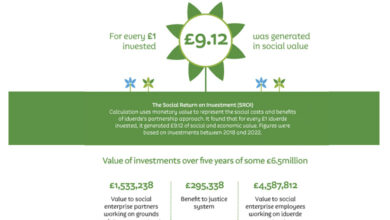Developing an all-island social economy

There is an opportunity to develop a co-ordination framework for greater cohesion on the development of social enterprise on the island of Ireland, according to an Irish Government advisory body.
The establishment of an all-island social enterprise forum could help consolidate collaboration and enhance the alignment of data collection exercises, according to the Irish Government’s national advisory body on social and economic issues.
Whilst the report acknowledges that there is a reasonably strong level of cross-border collaboration in Ireland, the National Economic and Social Council (NESC) states that the establishment of the forum could greatly enhance the level of collaboration.
It is recommended that any such forum would include the national social enterprise networks Social Enterprise Republic of Ireland (SERI), Irish Social Enterprise Network (ISEN), and Social Enterprise NI (SENI).
“An all-island forum would help to consolidate collaboration and provide opportunities for additional activities and supports to social enterprises operating on an all-island basis,” it states.
Another area identified for potential for expansion is increasing cross-border alignment of data collection exercises. The last survey of social enterprises in Northern Ireland took place in 2018 (and reported in 2019) and the only national survey of social enterprises in the Republic took place in 2022 (due to be reported in 2023).
The report asserts: “In future, it would be useful for these two exercises to coincide and to collect comparable data to inform an all-island picture of the scale and nature of social enterprises across the island.”
The report was part of NESC’s work for the Shared Island Unit in the Department of the Taoiseach, with social enterprise being one of a number of areas considered in the Irish Government’s Shared Island Initiative.
Developing a co-ordination framework
Explaining that the role of social enterprises is growing both on the island of Ireland and internationally, the NESC report states that developing a cross-border social enterprise framework “would assist in bringing greater awareness and understanding to the role and potential of social enterprise”.
“The development of a co-ordinating framework would bring a cross-government perspective and would set out the main stakeholders and supports for social enterprise, yet allow some self-definition within the framework to encapsulate the diversity of social enterprises.”
In order to develop said framework, the NESC report outlines that there is still a need for clarity on the definition of social enterprise, explaining that the most productive solution is to retain the definition set out by the Irish Government’s National Social Enterprise Policy, but that there is a need to “set out clearly how it will be interpreted in practice, and how social enterprise sits within the broader social economy”.
As a relatively fledgling sector across the sector, the NESC asserts that “funding and financial support are critical to social enterprises for start-up, scaling, sustainability, and in some cases for viability”. Currently, various sources of funding are available, from grants and loans, from the Irish Government, from social enterprise funders, from the European Union, and from philanthropists and trusts. The report states that the introduction of a “catalogue setting out the roles of the various funders and what is available would be helpful”.
Another goal which would be worked towards by the prospective co-ordination framework would be ensuring that there is support for volunteers. “Volunteers,” the report explains, “are an integral part of social enterprises, both for governance and for activities within enterprises.
“Attention needs to be given to recruiting, supporting and retaining volunteers to enable social enterprises to function effectively.”
Embedding social enterprise
The NESC states that various measures need to be taken to build on current initiatives and to progress new areas ripe for development. “The support of public organisations, the private sector and the third sector, including social enterprises themselves, will be required to achieve this,” the report says.
According to the NESC, there needs to be a stronger focus on enterprise, with the report stating that “there is a general sense that the enterprise side of social enterprise could be further developed”.
With an acknowledgement that the Irish Government’s White Paper on Enterprise recognises social enterprise as an integral part of Ireland’s broad enterprise landscape, the NESC report states that “additional mechanisms and approaches are required from the enterprise sector to support social enterprises, through organisations such as Enterprise Ireland and the LEOs, where there is a need for greater consistency across the country”.





